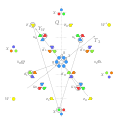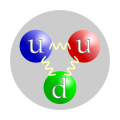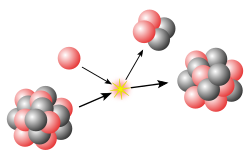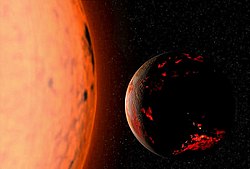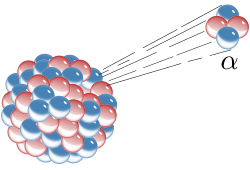In particle physics, proton decay is a hypothetical form of particle decay in which the proton decays into lighter subatomic particles, such as a neutral...
23 KB (2,555 words) - 07:59, 20 July 2025
Protons have a positive charge distribution, which decays approximately exponentially, with a root mean square charge radius of about 0.8 fm. Protons...
63 KB (6,585 words) - 03:51, 10 July 2025
example, beta decay of a neutron transforms it into a proton by the emission of an electron accompanied by an antineutrino; or, conversely a proton is converted...
64 KB (7,724 words) - 18:34, 26 July 2025
Proton emission (also known as proton radioactivity) is a rare type of radioactive decay in which a proton is ejected from a nucleus. Proton emission can...
5 KB (478 words) - 23:39, 11 August 2024
Positron emission (redirect from Beta plus decay)
Positron emission, beta plus decay, or β+ decay is a subtype of radioactive decay called beta decay, in which a proton inside a radionuclide nucleus is...
9 KB (1,145 words) - 22:57, 7 June 2025
slowly and inexorably grow darker. According to theories that predict proton decay, the stellar remnants left behind will disappear, leaving behind only...
51 KB (5,534 words) - 22:32, 17 June 2025
Georgi–Glashow model (section Proton decay in SU(5))
yields a mechanism for proton decay, and the rate of proton decay can be predicted from the dynamics of the model. However, proton decay has not yet been observed...
27 KB (4,583 words) - 08:31, 8 June 2025
R-parity (section Proton decay)
together, they lead to proton decay. Thus there are further maximal bounds on values of the couplings from maximal bounds on proton decay rate. Without baryon...
12 KB (1,558 words) - 16:51, 22 July 2025
Hyper-Kamiokande (section Proton decay)
(also Super-K or SK) and T2K experiments, it is designed to search for proton decay and detect neutrinos from natural sources such as the Earth, the atmosphere...
30 KB (3,268 words) - 10:15, 12 February 2025
Earth survives when the Sun expands to become a red giant and whether proton decay will be the eventual end of all matter in the universe. All projections...
180 KB (7,923 words) - 12:28, 28 July 2025
primary problem with these color triplet Higgs is that they can mediate proton decay in supersymmetric theories that are only suppressed by two powers of...
7 KB (1,250 words) - 22:41, 7 June 2025
Super-Kamiokande (redirect from Super-Kamioka Nucleon Decay Experiments)
observatory was designed to detect high-energy neutrinos, to search for proton decay, study solar and atmospheric neutrinos, and keep watch for supernovae...
49 KB (6,692 words) - 03:16, 29 July 2025
Weak hypercharge (section Proton decay)
Hence neutron decay conserves baryon number B and lepton number L separately, so also the difference B − L is conserved. Proton decay is a prediction...
13 KB (876 words) - 14:40, 24 May 2025
a helium-4 atom, which consists of two protons and two neutrons. For example, uranium-238 undergoes alpha decay to form thorium-234. While alpha particles...
19 KB (2,546 words) - 18:43, 26 July 2025
much more common result of proton–proton reactions within the star, and diprotons almost immediately decay back into two protons. Since the conversion of...
22 KB (2,250 words) - 14:07, 18 July 2025
unification might be detected through indirect observations of the following: proton decay, electric dipole moments of elementary particles, or the properties of...
32 KB (4,126 words) - 21:26, 18 July 2025
artificial nuclei decay with the emission of single protons, double protons, and other combinations. Beta decay transforms a neutron into proton or vice versa...
96 KB (9,922 words) - 17:45, 25 July 2025
SO(10) (section Proton decay)
triplets have to be really heavy in order to prevent triplet-mediated proton decays. See doublet-triplet splitting problem. Among the solutions for it is...
11 KB (1,593 words) - 12:54, 24 June 2025
Kamioka Observatory (redirect from Kamioka Nucleon Decay Experiment)
for Kamioka Nucleon Decay Experiment. It was a large water Čerenkov detector designed to search for proton decay. To observe the decay of a particle with...
24 KB (2,910 words) - 10:26, 22 July 2025
: §IIIE If protons are not stable, white dwarfs will also be kept warm by energy released from proton decay. For a hypothetical proton lifetime of 1037...
12 KB (1,329 words) - 21:36, 19 July 2025
X (charge) (section X charge in proton decay)
Y_{\text{W}}.} Proton decay is a hypothetical form of radioactive decay, predicted by many grand unification theories. During proton decay, the common baryonic...
5 KB (326 words) - 05:53, 10 August 2023
Radionuclide (redirect from Proton deficient)
been observed to decay, and are classically considered stable. Of these, 90 are believed to be absolutely stable except to proton decay (which has never...
28 KB (2,519 words) - 18:27, 26 July 2025
Isotopes of hydrogen (section Decay chains)
nucleus consists of only a single proton, so it has the formal name protium. The proton has never been observed to decay, so 1H is considered stable. It...
16 KB (1,902 words) - 02:24, 25 July 2025
nuclear species) are a class of atoms characterized by their number of protons, Z, their number of neutrons, N, and their nuclear energy state. The word...
15 KB (1,384 words) - 19:19, 19 July 2025
inverse beta decay, a proton and a sufficiently energetic antineutrino may combine into a neutron and a positron. Understanding of the beta decay process developed...
21 KB (1,904 words) - 10:09, 30 July 2025
physics, double beta decay is a type of radioactive decay in which two neutrons are simultaneously transformed into two protons, or vice versa, inside...
38 KB (3,818 words) - 01:51, 11 April 2025
(constituents of protons and others) to leptons (such as positrons), allowing violation of the conservation of baryon number thus permitting proton decay. However...
7 KB (603 words) - 13:48, 17 July 2025
Muon (redirect from Muon decay)
by other atoms. When a cosmic ray proton impacts atomic nuclei in the upper atmosphere, pions are created. These decay within a relatively short distance...
46 KB (5,576 words) - 13:26, 22 July 2025
radioactive, with extremely long half-lives (discounting the possibility of proton decay, which would make all nuclides ultimately unstable). Some stable nuclides...
50 KB (6,062 words) - 13:58, 27 July 2025
Takumi; Omura, Yuji (2016). "Threshold corrections to dimension-six proton decay operators in non-minimal SUSY SU (5) GUTs". Nuclear Physics B. 910: 1–22...
10 KB (1,276 words) - 23:41, 8 June 2025

